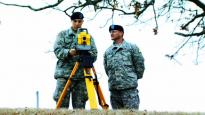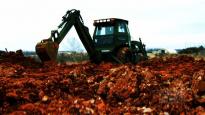
Build the foundations and pave the way for Guard operations.
Engineer
Training
Job training for Soldiers in the Engineer career field consists of ten weeks of
Basic Combat Training
Basic Combat Training:
Basic Combat Training (BCT) is a 10-week course of intense physical and mental training, during which recruits develop essential Soldier skills, discipline and values. plus 6-36 weeks of
Advanced Individual Training
Advanced Individual Training:
(AIT) Following Basic Training, Soldiers attend AIT to learn a military job skill. Depending on the specialty, training ranges from 1 month to 1 year., depending on your specialty. Training will range from basic construction, engineering and electrical principles to more specialized skills, such as masonry, plumbing and water purification, surveying, operating heavy construction equipment—even firefighting, and underwater welding and cutting.
Civilian Related
The skills you learn in the Engineer career field will prepare you for practically any position in the fields of commercial and residential construction, electrical engineering, building inspection or building engineering. You can also consider a future in surveying, architecture, paving and road construction. You might also consider a career in marine salvage and underwater construction or firefighting.
-
12B Combat Engineer
Combat Engineers provide the combination of combat ability and building skills necessary for tackling rough terrain in combat situations. Engineers build roads or trails, assemble bridges, and construct shelters, bunkers and gun emplacements, allowing armored and infantry divisions to advance. They also place and detonate explosives and oversee the safe removal of mines.
-
12C Bridge Crewmember
Bridge Crews work alongside Combat Engineers to help tackle rough terrain in combat situations. Bridge Crewmembers build and provide bridges and rafts for wet and dry gap-crossing operations by preparing bridge sites, launching or retrieving ribbon bridge bays, and assisting in the assembly of military bridges. Bridge Crewmembers may also participate in combat operations as required.
-
12D Diver
Some Army and National Guard operations actually take place underwater. An important member of the Engineering department, the Diver performs such tasks as reconnaissance, demolition and salvage, either as a scuba diver, working just below the surface of the water, or as a deep sea diver, working for long periods in depths up to 300 feet. Guard divers specialize in underwater patrol, repair and construction.
-
12G Quarrying Specialist
The Guard takes part in hundreds of construction projects, including airfields, roads, dams and buildings, which require moving tons of earth or producing concrete and asphalt. Quarrying Specialists operate pneumatic, electric and gas-powered machinery for excavation activities including drilling, blasting, crushing, screening, washing and moving large amounts of rock, in quarries, at construction sites or in combat engineer missions.
-
12K Plumber
Army and National Guard buildings and equipment all require pipe systems for water, steam, gas and waste. Plumbers are responsible for installing and repairing plumbing and pipe systems. Plumbers read drawings and blueprints, plan pipe system layouts, and install pipes, fixtures and connectors, in addition to troubleshooting, testing and calibrating hydraulic and pneumatic systems.
-
12M Firefighter
All Army bases have their own protection services, including Military Police and Fire departments. Firefighters are responsible for protecting lives and property by controlling and helping prevent fires in buildings, on aircraft and aboard ships. Guard firefighters’ responsibilities are much like their civilian counterparts, including operating firefighting trucks and emergency rescue vehicles, performing firefighting and rescue operations, giving first aid to injured personnel, and responding to hazardous material emergencies.
-
12N Horizontal Construction Engineer
The Guard takes part in hundreds of construction projects, including airfields, roads, dams and buildings, which require moving tons of earth and building materials or producing concrete and asphalt. Horizontal Construction Engineers use bulldozers, cranes, graders and other heavy equipment such as scoop loaders, power shovels and towed or self-propelled scrapers to complete these kinds of projects and assist in performance of combat engineer missions.
-
12Q Power Line Distribution Specialist
The Power Line Distribution Specialist supervises or installs and maintains electrical distribution system. Your responsibilities might include assisting in installation of electrical Prime Power Distribution systems and exterior services and assisting in the erection of utility poles.
-
12R Interior Electrician
Interior Electricians are responsible for installing and repairing electrical wiring systems in offices, hospitals, repair shops, hangars and other Army and Guard buildings. Electricians install and maintain all electrical components from transformers and service panels to circuit breakers, switches and power outlets. They also repair and replace faulty wiring and lighting fixtures.
-
12T Technical Engineer
From airstrips and roads to docks and barracks, the Guard is always involved in construction projects, and the Technical Engineer is essential to this process. Technical Engineers supervise or participate in construction site development as surveyors or draftsmen, helping develop construction plans and specifications, and supplying technical drawing diagrams for wiring and plumbing of structures. They also provide surveys and maps that are used to locate military targets and plot troop movements.
-
12V Concrete and Asphalt Equipment Operator
From airstrips and roads to dams and bridges, the Guard is always involved in construction projects. Concrete and Asphalt Equipment Operators are essential to this process, supervising or operating all equipment used in concrete and asphalt production and paving. They operate concrete mobile mixers, assist in all phases of asphalt production, paving and surfacing, and assist in combat engineer missions.
-
12W Carpentry and Masonry Specialist
As a part of the engineering corps, Carpentry and Masonry Specialists perform general heavy carpentry, structural steel and masonry duties. From assisting in building layout and concrete foundations to framing, flooring, walls and roofing structures, Carpentry and Masonry Specialists erect buildings and structures from the ground up. They also handle repairs to all types of structures and may assist in combat engineer missions.
-
12X General Engineering Supervisor
As a member of the engineering corps, the General Engineering Supervisor oversees general engineering activities related to all Army construction and utility operations. General Engineering Supervisors assist Engineering Officers with construction planning, scheduling and material estimating, as well as providing staff supervision and principal Non-commissioned Officer direction to units performing general engineering missions.
Note: This MOS requires completion of the Advanced Leadership Course (ALC) and the Senior Leadership Course (SLC), and an Associate of Arts/Associate of Science in engineering technology, general studies, fire science, draftsman, surveying or oceanographic tech.
-
12Y Geospatial Engineer
Not an Entry-Level Position - The Army is always in need of maps, graphics and overlays that help commanders visualize the battlefield, locate military targets and help plot troop movements. The Geospatial Engineer collects and processes military geographic information from remote sensed imagery, digital data, intelligence data, existing maps and surveys, and other sources, and converts it into tangible products such as maps, overlays, prints and special products.
-
74D Chemical, Biological, Radiological and Nuclear Specialist
Emergency management specialists, such as the Chemical, Biological, Radiological and Nuclear Specialist, prepare emergency plans and procedures for all types of disasters, including floods, earthquakes, hurricanes, biological warfare and enemy attacks. They are primarily responsible for operating, maintaining or supervising the use of nuclear, biological and chemical (NBC) detection and decontamination equipment, as well as smoke-generating equipment. They also train military and civilian personnel on what to do in an emergency.
-
89D Explosive Ordnance Disposal Specialist
Ammunition and weapons, also known as ordnance, are hazardous materials, and their handling and storage must be carried out very carefully. Explosive Ordnance Disposal (EOD) teams are responsible for identifying and disposing of foreign and domestic explosive devices, such as unexploded conventional munitions, chemical munitions, nuclear weapons and Improvised Explosive Devices. EOD Specialists also assist in locating and defusing buried ordnance and in the operation of Emergency Contamination Control Stations and Emergency Personnel Decontamination Stations.





